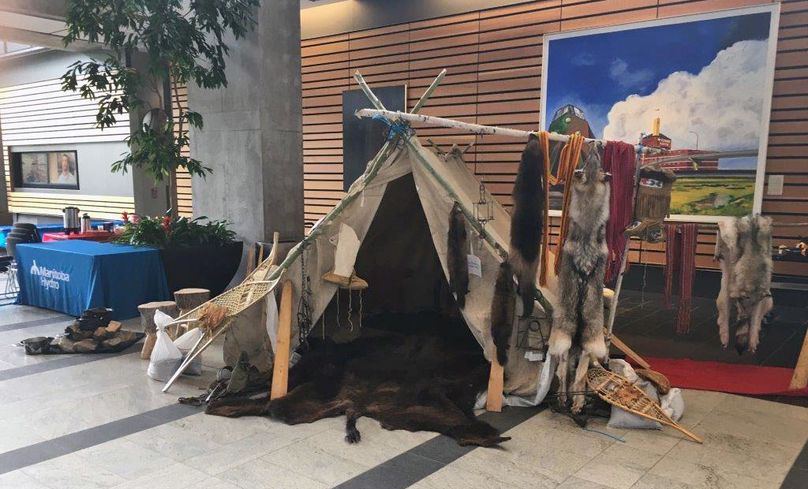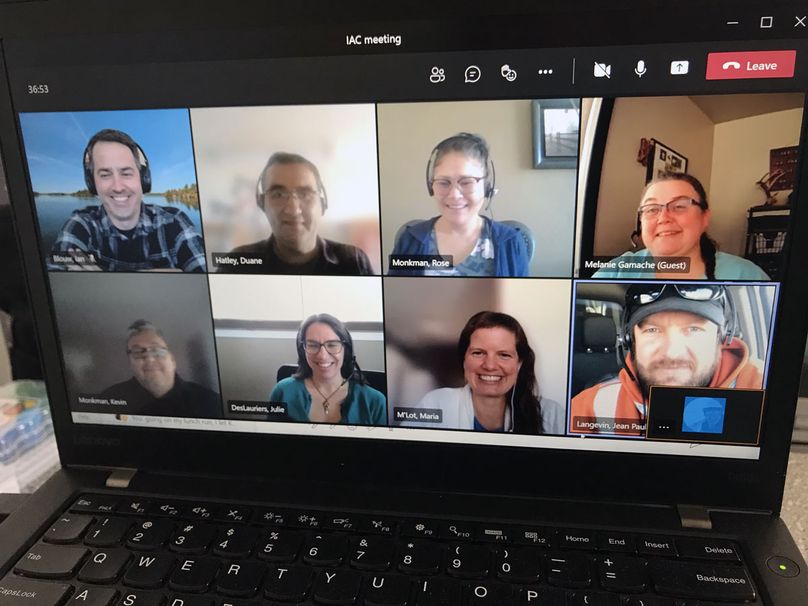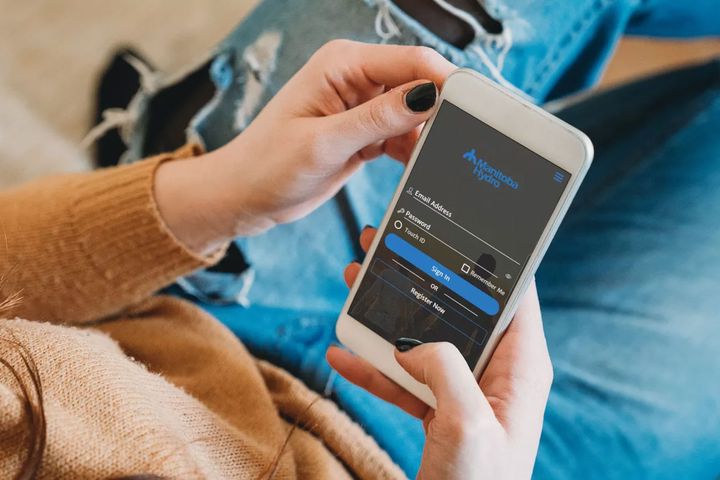Volunteers work hard to raise Indigenous awareness within Manitoba Hydro

National Indigenous Peoples Day 2019 was recognized with displays set up by the IAC in the main floor gallery at 360 Portage Ave.
“Each of us has a story to tell. Understanding each other’s perspectives and stories is a journey of learning that creates a foundation of respect and appreciation for all cultures. It’s a foundation that we can take to other parts of our lives and our homes and share with others,” says Maria M’Lot.
In Indigenous culture, storytelling has enabled generations of people to pass on and share their traditional knowledge, cultural beliefs, values, history, and ways of life. It is through storytelling that Manitoba Hydro’s internal Indigenous Awareness Circle (IAC) share Indigenous history, culture, and current issues within our organization.
The volunteer committee has worked hard over many years to establish an active – and interactive – presence by hosting regular speakers, events and activities for employees to participate in.
June 2019 marked a significant highlight of the IAC’s efforts and the progress of Indigenous Relations within Manitoba Hydro, for volunteer Melanie Gamache.
“In recognition of National Indigenous Peoples Day, we set up displays in our 360 Portage Avenue main floor gallery open to the public, and each of us brought in things to talk about and show. It was a good day to have such a vibrant, public presence in our lobby and to be seen – to be part of everything out in the open. Twenty or thirty years ago, this wouldn’t have happened and that is not so long ago,” says Melanie. “When you are able to make things visible and available – people are able to talk about them and ask questions. It helps people to learn and have greater understanding of each other’s story, which can help break the trend of racism.”
Manitoba Hydro has a presence right across our province and a long history of interaction with many Indigenous peoples, especially those in communities along the river systems affected by hydroelectric development – the Churchill, Laurie, Nelson, Saskatchewan, Rat-Burntwood, and Winnipeg river systems.
“Indigenous people are the fastest growing demographic in Manitoba, and currently make up almost 20 per cent of our workforce within Manitoba Hydro. Indigenous people are our colleagues, our customers and our business partners,” says Jeff Betker, Vice-President, External & Indigenous Relations and Communications. “Learning about Indigenous peoples and cultures allows each of us to better understand our customers and the communities we serve, through IAC events and opportunities to learn together, share stories and ask questions in an environment that is safe and welcoming for everyone.”

Duane, Maria, and Melanie (pre-pandemic) at National Indigenous Peoples Day, June 2019.
Enlarge image: A man and two women stand in front of a trapper’s tent display.
In the 31 years that volunteer IAC member, Duane Hatley has worked for Manitoba Hydro he has seen changes in Indigenous Relations.
“Our impact on communities and how we operated in the past to how we operate today is definitely positive. Through our partnerships with communities and how we work, we are opening up peoples’ eyes – in the awareness we raise and by encouraging the same values with contractors on our projects and how we approach our work in consultation with First Nations.”
IAC volunteer, Ian Blouw agrees. “Through our Indigenous Speaker Series, we hear from our employees and learn about their perspectives. There are many experiences and things that people maybe aren’t really fully aware of and that happened not that long ago – such as one employee’s powerful, personal story about the Sixties Scoop that they shared.”
The Sixties Scoop refers to the placement of First Nations and Metis children in adoptive homes between 1960 and up until the 1980’s, with the highest numbers of adoptions occurring in the 1960s. In many instances, Indigenous children were “scooped” from their homes and communities without the knowledge of their families and bands.
Rose Monkman, herself a Sixties Scoop survivor, feels it is important to volunteer her time with the IAC to help bring Indigenous awareness forward.
“I was adopted and a survivor of the Sixties Scoop. My mothers’ and grandmother were victims of residential schools. It’s important for me to be a part of the IAC as your coworker, friend and colleague, to bring forward awareness of our stories,” says Rose.
Julie DesLauriers also continues to learn about and share her culture in honour of her ancestors.
“My paternal grandmother lost her status and identity from her community after marrying someone who was not First Nations. My family is exploring how to regain that identity in her honour, and by understanding my history I can help my family find what was lost to us,” says Julie. “I honour my culture by educating myself and others. I honour my culture by speaking up to share my story and encourage others to do the same. Our voices and stories deserve to be heard.
“Within Manitoba Hydro, the IAC has given us a platform to learn and share, and for that I am thankful.”

IAC members meet online. Top row, left to right: Ian Blouw, Duane Hatley, Rose Monkman, Melanie Gamache. Bottom row, left to right: Kevin Monkman, Julie DesLauriers, Maria M’Lot and Jean Paul Langevin.
Enlarge image: IAC volunteers group video meeting on a laptop screen.
The Indigenous Awareness Circle (IAC) currently has eight volunteer members: Maria M’Lot, Melanie Gamache, Ian Blouw, Julie DesLauriers, Kevin Monkman, Rose Monkman, Duane Hatley, and Jean Paul Langevin.



